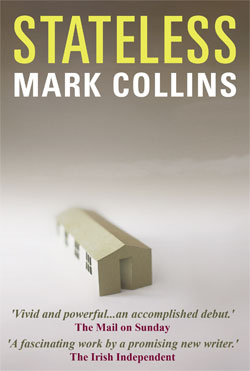Reviews
The Irish Independent
Reviewed by Ann Dunne
The events in Mark Collins' first novel would seem to be forgotten, yet ask anyone old enough to have been around in 1956 and they can reel off the names of President Imre Nagy and Cardinal Mindszenty.
It was the time when Soviet tanks were used to crush the Hungarian Uprising, when peaceful demonstrations led to strong-arm tactics by Hungary's secret police. As 170,000 refugees flooded into neighbouring Austria and Yugoslavia, refugee camps were soon overwhelmed and Ireland, under Taoiseach de Valera, promised asylum to 1,000 Hungarians - giving preference to professional Catholic families.
With customary generosity, the Irish held fundraisers and a large crowd welcomed the new arrivals, landing at Shannon on an Aer Lingus Viscount in mid-winter, to be housed in army billets in Knockalisheen Camp outside Limerick under the auspices of the Red Cross.
But what happened next makes uncomfortable reading. Hoping for jobs and a new life in the West, the refugees were unaware that Ireland was haemorrhaging more than 40,000 of its own economic migrants a year at the time.
Ireland really had no asylum to offer. The disgruntled Hungarians felt trapped (many had believed they would be going on to the USA) and were soon complaining - some even risked returning home - until eventually they went on hunger strike, which the Irish saw as ungrateful.
Collins brings the story to life in fictional form in his novel. Twins Sandor and Eva Lovas, non-believers with a Presbyterian background and Eva's 11-year-old daughter Kristina, leave their parents behind, escape to Austria and, professing to be Catholic, arrive in Knockalisheen. They encounter kindly Irish, cute hoors and sleeveens.
Eva, a teacher, can only get domestic work and Sandor's attempts to work as an engineer are blocked by the trade union. Sandor becomes a leader in camp (where former Hungarian secret police are mixing incognito with people they once tortured). He oversees the hunger strike, negotiating with UN and Irish Government officials.
Romances spring up in these distressed conditions and both find Hungarian parters in camp and begin to plan a new life.
Of the expected 1,000 refugees, only 520 ever came, as the Irish
Government couldn't provide another camp. Eventually it was Archbishop John Charles McQuaid who had the clout to help them travel on to America.
Born in 1972, Collins' grasp of 1950s Ireland is impressive. His unsentimental style is tempered with poignant scenes, like the Lovas' first glimpse of Christmas lights in Limerick. And there is humour:Eva, not wishing to offend her Catholic hostess when asked to say grace, recites Humpty Dumpty in her native tongue slowly and solemnly.
Inspired by the author's Hungarian grandparents (on his mother's side) who came here as refugees in 1956, Stateless is a fascinating and memorable work by a promising new writer.
The Sunday Tribune
Reviewed by Tom Widger
UNIQUE idea for a novel. Set over a period of six months in the mid-fifties in Ireland, around 500 refugees arrived in Ireland. This was a period in our history when tens of thousands of Irish were trying to raise the fare to escape the poverty of the place. The refugees were Hungarian. The Hungarian Communist Party had sought a form of independence from Moscow. Street fighting erupted in Budapest. Khruschev sent in the tanks.
Tens of thousands crossed into Austria, and on to western Europe. The 500 who arrived here, to wallow in the affluent consumer culture of western Europe, were quickly disillusioned. Some even opting to return to Budapest. Marvellous story. And Collins tells it well. The account of the refugees' day-to-day existence is satisfyingly detailed. The focus centres on Sandor Lovas and his sister Eva. Both are about to experience crippling uncertainty and learn that only love endures in the time of uncertainty.
The Irish Mail on Sunday
Stateless is extensively researched and gives a flavour of the grey and hopeless
essence of Ireland at its economic nadir of 1956/57...vivid and powerful ...an
accomplished debut.
The Sunday Business Post
A story of deliverance and disillusion, of dashed hopes
and uncertain futures ...capturing the minutiae of personal issues faced by
minorities in adversity.
Books Ireland
Collins paints a convincing picture ...and brings to life an obscure chapter of
our recent history.
